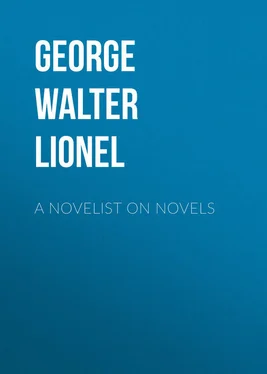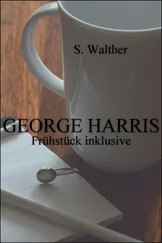Walter George - A Novelist on Novels
Здесь есть возможность читать онлайн «Walter George - A Novelist on Novels» — ознакомительный отрывок электронной книги совершенно бесплатно, а после прочтения отрывка купить полную версию. В некоторых случаях можно слушать аудио, скачать через торрент в формате fb2 и присутствует краткое содержание. Жанр: foreign_antique, foreign_prose, foreign_sf, на английском языке. Описание произведения, (предисловие) а так же отзывы посетителей доступны на портале библиотеки ЛибКат.
- Название:A Novelist on Novels
- Автор:
- Жанр:
- Год:неизвестен
- ISBN:нет данных
- Рейтинг книги:3 / 5. Голосов: 1
-
Избранное:Добавить в избранное
- Отзывы:
-
Ваша оценка:
- 60
- 1
- 2
- 3
- 4
- 5
A Novelist on Novels: краткое содержание, описание и аннотация
Предлагаем к чтению аннотацию, описание, краткое содержание или предисловие (зависит от того, что написал сам автор книги «A Novelist on Novels»). Если вы не нашли необходимую информацию о книге — напишите в комментариях, мы постараемся отыскать её.
A Novelist on Novels — читать онлайн ознакомительный отрывок
Ниже представлен текст книги, разбитый по страницам. Система сохранения места последней прочитанной страницы, позволяет с удобством читать онлайн бесплатно книгу «A Novelist on Novels», без необходимости каждый раз заново искать на чём Вы остановились. Поставьте закладку, и сможете в любой момент перейти на страницу, на которой закончили чтение.
Интервал:
Закладка:
In all this, where is hope? How many green daffodil heads, trying to burst their painful way through the heavy earth of a dull life, has Mr Bennett trampled on? Is it impossible to find some one who is (as Mr Bennett certainly is), capable of the highest artistic appreciation and of high literary achievement, and who will, for a moment, put himself in the place of the people he is addressing? Is it impossible for an adult to remember that as a boy he hated the classics? Has he forgotten that as a young man he could be charmed, but educated only by means of a machine like the one they use for stuffing geese? The people we want to introduce to literature are, nearly all of them, people who work; some earn thirty shillings a week, and ponder a great deal on how to live on it; some earn hundreds a year and are not much better off; all are occupied with material cares, their work, their games, their gardens, their loves; nearly all are short of time, and expend on work, transit, and meals, ten to twelve hours a day. They read in tubes and omnibuses, in the midst of awful disturbance and overcrowding; also they are deeply corrupted by the daily papers, where nothing over a column is ever printed, where the news are conveyed in paragraphs and headlines, so that they never have to concentrate, and find it difficult to do so; they are corrupted too by the vulgarity and sensationalism which are the bones and blood of the magazines, until they become unable to think without stimulants.
It is no use saying those people are lost. They are not lost, but they have gone astray, or rather, nobody has ever tried to turn their faces the right way. Certainly Mr Arnold Bennett does nothing for them. If they could read The Decline and Fall of the Roman Empire they would, but they cannot. People cannot plunge into old language, old atmospheres; they have no links with these things; their imagination is not trained to take a leap; many try, and nearly all fail because their literary leaders go to sleep, or march them into bogs. No crude mind can jump into ancient literature; modern literature alone can help it, namely cleanse its nearest section, and prepare it for further strain. The limits of literary taste can, in each person, be carried as far as that person's intellectual capacity goes, but only by degrees . In other words, limit your objective instead of failing at a large operation.
I am not prepared to lay down a complete list, but I am prepared to hint at one. If I had to help a crude but willing taste, I would handle its reading as follows: —
First Period
Reading made up exclusively of recent novels, good, well-written, thoughtful novels, not too startling in form or contents. I would begin on novels because anybody can read a novel, and because the first cleansing operation is to induce the subject to read good novels instead of bad ones. Here is a preliminary list: —
Tony-Bungay (Wells)
Kipps (Wells)
The Custom of the Country (Wharton)
The Old Wives' Tale (Bennett)
The Man of Property (Galsworthy)
Jude the Obscure (Hardy)
Tess of the D'Urbervilles (Hardy)
Sussex Gorse (Kaye-Smith)
and say twenty or thirty more of this type, all published in the last dozen years. It is, of course, assumed that interest would be maintained by conversation.
Second Period
After the subject (victim, if you like) had read say thirty of the best solid novels of the twentieth century, I think I should draw him to the more abstruse modern novels and stories. In the first period he would come in contact with a general criticism of life. In the second period he would read novels of a more iconoclastic and constructive kind, such as: —
The Island Pharisees (Galsworthy)
The New Machiavelli (Wells)
Sinister Street (Mackenzie)
The Celestial Omnibus (Forster)
The Longest Journey (Forster)
Sons and Lovers (Lawrence)
The White Peacock (Lawrence)
Ethan Frome (Wharton)
Round the Corner (Cannan)
Briefly, the more ambitious kind of novel, say thirty or forty altogether. At that time, I should induce the subject to browse occasionally in the Oxford Book of English Verse .
Third Period
Now only would I come to the older novels, because, by then, the mind should be supple enough to stand their congestion of detail, their tendency to caricature, their stilted phrasing, and yet recognise their qualities. Here are some: —
The Rise of Silas Lapham (Howells)
Vanity Fair (Thackeray)
The Vicar of Wakefield (Goldsmith)
The Way of All Flesh (Butler)
Quentin Durward (Scott)
Guy Mannering (Scott)
Briefly, the bulk of the works of Thackeray, Jane Austen, Charlotte Brontë, and George Eliot. 'Barry Lyndon' twice, and Trollope never. Here, at last, the solid curriculum, but only, you will observe, when a little of the mud of the magazines had been cleaned off. Rather more verse too, beginning with Tennyson and Henley, passing on to Rossetti and perhaps to Swinburne. Verse, however, should not be pressed. But I think I should propose modern plays of the lighter kind, Mr Bernard Shaw's Major Barbara and John Bull's Other Island , for instance. One could pass by degrees to the less obvious plays of Mr Shaw, certainly to those of St John Hankin, and perhaps to The Madras House . I think also a start might be made on foreign works, but these would develop mainly in the
Fourth Period
Good translations being available, I would suggest notably: —
Madame Bovary (Flaubert)
Resurrection (Tolstoi)
Fathers and Children (Turgenev)
Various short stories of Tchekoff.
And then, if the subject seemed to enjoy these works ,
L'Education Sentimentale (Flaubert)
Le Rouge et le Noir (Stendhal)
The Brothers Karamazov (Dostoievsky)
Mark this well, if the subject seemed to enjoy them. If there is any strain, any boredom, there is lack of continuity, and a chance of losing the subject's interest altogether. I think the motto should be 'Don't press'; that is accepted when it comes to golf; why has it never been accepted when it affects man? This period would, I think, end with the lighter plays of Shakespeare, such as The Merry Wives of Windsor , The Taming of the Shrew , and perhaps Hamlet . I think modern essays should also come in via Mr E. V. Lucas, Mr Belloc, and Mr Street; also I would suggest Synge's travels in Wicklow, Connemara, and the Arran Islands; this would counteract the excessive fictional quality of the foregoing.
Fifth Period
I submit that, by that time, if the subject had a good average mind, he would be prepared by habit to read older works related with the best modern works. The essays of Mr Lucas would prepare him for the works of Lamb; those of Mr Belloc, for the essays of Carlyle and Bacon. Thus would I lead back to the heavier Victorian novels, to the older ones of Fielding and Sterne. If any taste for plays has been developed by Shakespeare, it might be turned to Marlowe, Congreve, and Sheridan. The drift of my argument is: read the easiest first; do not strain; do not try to 'improve your mind,' but try to enjoy yourself. Than books there is no better company, but it is no use approaching them as dour pedagogues. Proceed as a snob climbing the social ladder, namely, know the best people in the neighbourhood, then the best people they know. The end is not that of snobbery, but an eternal treasure.
I think that my subject, if capable of developing taste, would find his way to the easier classic works, such as Carlyle's French Revolution , Boswell's Life of Johnson , perhaps even to Wesley's Journal . But at that stage the subject would have to be dismissed to live or die. Enough would have been done to lead him away from boredom, from dull solemnity and false training, to purify his taste and make it of some use. The day is light and the past is dark; all eyes can see the day and find it splendid, but eyes that would pierce the darkness of the past must grow familiar with lighter mists; to every man the life of the world about him is that man's youth, while old age is ill to apprehend.
Читать дальшеИнтервал:
Закладка:
Похожие книги на «A Novelist on Novels»
Представляем Вашему вниманию похожие книги на «A Novelist on Novels» списком для выбора. Мы отобрали схожую по названию и смыслу литературу в надежде предоставить читателям больше вариантов отыскать новые, интересные, ещё непрочитанные произведения.
Обсуждение, отзывы о книге «A Novelist on Novels» и просто собственные мнения читателей. Оставьте ваши комментарии, напишите, что Вы думаете о произведении, его смысле или главных героях. Укажите что конкретно понравилось, а что нет, и почему Вы так считаете.












